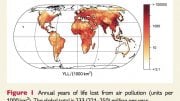
This meta-analysis, which includes the most recent studies evaluating the link between air pollution and dementia, is the first to include studies based on active case ascertainment and to evaluate studies using a new, more powerful bias assessment tool. The findings support the public health importance of a proposal, currently under consideration by the Environmental Protection Agency, to strengthen regulations on PM2.5
A new meta-analysis from Harvard T.H. Chan School of Public Health suggests that exposure to fine particulate air pollutants (PM2.5) may be linked to an increased risk of dementia.
“This is a big step in providing actionable data for regulatory agencies and clinicians in terms of making sense of the state of the literature on this hugely important health topic. The results can be used by organizations like the Environmental Protection Agency, which is currently considering strengthening limits on PM2.5 exposure,” said lead author Marc Weisskopf, Cecil K. and Philip Drinker Professor of Environmental Epidemiology and Physiology. “Our findings support the public health importance of such a measure.”
The study is the first systematic review and meta-analysis to use the new Risk of Bias In Non-Randomized Studies of Exposure (ROBINS-E) tool, which addresses bias in environmental studies in greater detail than other assessment approaches. Additionally, it’s the first study that incorporates more recent research utilizing “active case ascertainment.” This technique involves the screening of entire study populations, followed by face-to-face dementia evaluations of participants who did not have dementia at baseline.
The study was recently published in The BMJ.
More than 57 million people worldwide are currently living with dementia, and estimates suggest that number will increase to 153 million by 2050. Up to 40% of these cases are thought to be linked to potentially modifiable risk factors, such as exposure to air pollutants.
Weisskopf and his co-authors, Elissa Wilker, researcher in the Harvard Chan-NIEHS Center for Environmental Health, and Marwa Osman, a doctoral student in the Biological Science in Public Health program, scanned more than 2,000 studies and identified 51 that evaluated an association between ambient air pollution and clinical dementia, all published within the last 10 years. Those studies were assessed for bias using ROBINS-E, and 16 of them met the criteria for the meta-analysis. The majority of the research was about PM2.5, with nitrogen dioxide and nitrogen oxide being the next most common pollutants studied. Of the studies used in the meta-analysis, nine used active case ascertainment.
The researchers found consistent evidence of an association between PM2.5 and dementia, even when annual exposure was less than the current EPA annual standard of 12 micrograms per cubic meter of air (μg/m3) In particular, among the studies using active case ascertainment, the researchers found a 17% increase in risk for developing dementia for every 2 μg/m3 increase in average annual exposure to PM2.5. They also found evidence suggesting associations between dementia and nitrogen oxide (5% increase in risk for every 10 μg/m3 increase in annual exposure) and nitrogen dioxide (2% increase in risk for every 10 μg/m3 increase in annual exposure), though the data was more limited.
The researchers noted that air pollution’s estimated association with risk of dementia is smaller than that of other risk factors, such as education and smoking. However, because of the number of people exposed to air pollution, the population-level health implications could be substantial.
“Given the massive numbers of dementia cases, identifying actionable modifiable risk factors to reduce the burden of disease would have tremendous personal and societal impact,” Weisskopf said. “Exposure to PM2.5 and other air pollutants is modifiable to some extent by personal behaviors—but more importantly through regulation.”
Reference: “Ambient air pollution and clinical dementia: systematic review and meta-analysis” by Elissa H Wilker, Marwa Osman and Marc G Weisskopf, 5 April 2023, The BMJ.
DOI: 10.1136/bmj-2022-071620
The study was funded by Biogen and the National Institutes of Health.









Be the first to comment on "Harvard Scientists Reveal That Air Pollution May Increase Risk of Dementia"